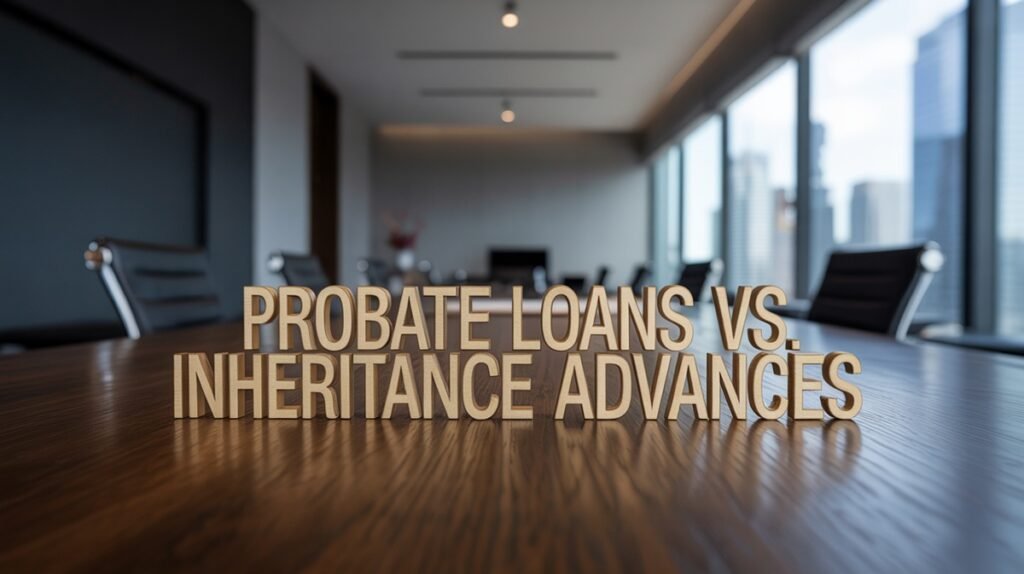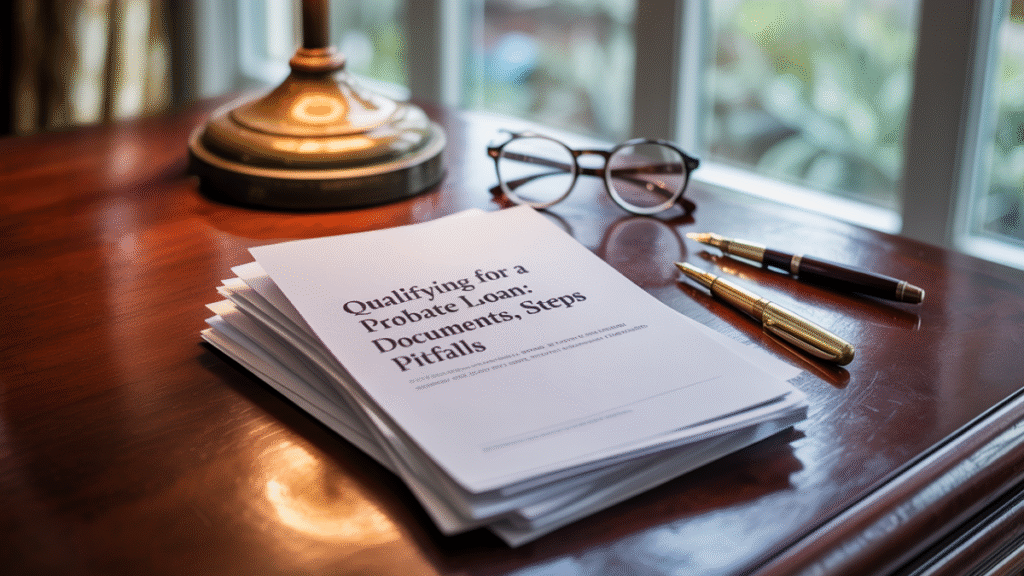| Pros | Cons |
| Fast cash in a few days | Reduces total inheritance received |
| No credit or income checks | Industry is not tightly regulated |
| No repayment if estate value drops | Not all heirs or estates qualify |
| Simple and fast approval process | Contracts may include complex terms |
| Spend funds with no restrictions | Can cause family disputes or tension |
💸 Avoid Hidden Costs
Some inheritance advance companies hide fees in the fine print.
See what a fair offer really looks like before you sign.
→ Use the Cost Calculator
What Is an Inheritance Advance and How Does It Work
Waiting for probate to clear your inheritance can drag on—especially if you need cash fast. That’s where inheritance advance companies help. They give you a lump sum now in exchange for a portion of your future inheritance.
Here’s how it generally works:
- Submit an application with your details, your relationship to the deceased, and information about the estate.
- The company reviews public records and contacts the executor to confirm your claim and the estate’s estimated value.
- You receive an offer, usually between 30% and 60% of your expected share.
- You sign an agreement, and the company wires the money to your account.
- When probate closes, the company gets paid directly from your inheritance portion.
There’s no interest, no credit check, and no monthly payments. The company takes the risk if the estate doesn’t pay out as much as expected.
Why Some People Go This Route
- Fast cash when needed: Probate can take months or even over a year. An inheritance advance gives you access to part of your money within days.
- No credit checks or income verification: Your personal financial situation doesn’t matter. Approval is based on the estate, not your credit report.
- No repayment risk: If the estate ends up being worth less than expected, you won’t owe anything extra. The company takes the hit.
- Simple application process: You won’t need stacks of paperwork. It typically includes just the ID, a death certificate, and probate information.
- Freedom to use funds your way: Whether you’re covering bills, funeral expenses, or paying off debt, there are no spending restrictions.
Downsides You’ll Want to Consider
- Smaller inheritance payout: The company takes a chunk of your final share. The $100,000 you were expecting may be reduced to $60,000 after the company receives payment.
- Lack of industry regulation: These businesses aren’t closely monitored like traditional lenders, so their practices vary significantly.
- Not everyone qualifies: If the estate has major debt or legal issues, or your claim isn’t clearly documented, the company might turn you down.
- Complicated agreements: Some contracts are filled with legal jargon. Without a lawyer’s help, you might miss details that cost you later.
- Possible tension with other heirs: If you take an advance without telling your family, it could cause drama—especially if it delays or affects their share.
Times When It Makes Sense to Use One
- You’re facing urgent financial pressure: Maybe it’s overdue bills, a looming eviction, or an emergency. Getting cash fast might outweigh waiting for a larger sum.
- Probate is dragging on: If there’s no end in sight and you can’t wait, an advance offers peace of mind.
- No better options available: If banks or credit cards are not an option, this might be the best route available.
- You’re okay giving up part of your inheritance: As long as you understand the trade-off, the decision can still be worth it.
Situations Where You’re Better Off Waiting
- You’re not in a rush: If you’re financially stable, there’s no need to give up a big portion of your inheritance to get it sooner.
- The estate is complicated: If things aren’t settled or there are legal disputes, the advance might not be worth the risk.
- You have better financial options: Maybe a family member can lend you money, or you qualify for a lower-cost personal loan.
- You’re unsure about the agreement: If you’re hesitant or don’t fully understand the terms, consider seeking legal advice before proceeding.
How to Pick a Trustworthy Inheritance Advance Company
- Clear fee breakdown: A reputable company will provide a transparent breakdown of its fees. No vague percentages or fine print surprises.
- Straightforward contract: Look for agreements that are easy to read. Complicated language could be hiding something.
- Strong reputation: Check reviews on BBB, Trustpilot, or legal forums. Avoid any company with too many red flags.
- Direct contact with the executor: Reputable companies coordinate with estate administrators, not just you.
- No sneaky charges: Avoid companies with hidden fees, service charges, or early repayment penalties.
Key tip: Always let a probate attorney review the agreement before you commit.
Other Ways to Access Funds While You Wait
- Personal loan: If your credit is decent, a personal loan could cost you less in the long run.
- Home equity loan: If you own a home, tapping into equity might provide a better deal.
- Borrow from family or friends: This might be an awkward situation, but it can save you thousands.
- Estate loan: These are more traditional, regulated loans based on the estate’s value.
- Talk to your creditors: Some offer hardship programs or temporary relief if you’re honest about your situation.
Conclusion
Inheritance advance companies offer a quick fix when you’re caught between waiting for probate and needing cash now. They’re not for everyone, and they’re not cheap. You’re trading part of your future payout for immediate funds. For some, that trade makes sense. For others, especially those with time and options, it’s not worth the cost.
Key takeaway: Understand what you’re giving up, compare your options, and read every contract carefully before committing to an inheritance advance.
FAQs
Are inheritance advances taxable?
Inheritance advances are typically not taxed, as inheritances themselves aren’t considered taxable income in most states. Still, checking with a tax advisor is a smart move.
Can I cancel the advance after signing?
Some companies allow cancellations within a short window, but not all do. Read the contract carefully to find out if and when you can back out.
Will the executor be informed?
Yes, inheritance advance companies generally contact the executor to verify the estate and your claim. They’ll also coordinate the payout once probate is closed.
What if the estate turns out to be smaller than expected?
You typically won’t owe anything more if the estate pays out less than expected. The company accepts the risk—unless you gave them incorrect information.
Do I have to give the company access to my bank account?
No, they don’t pull funds from your bank. They collect directly from your inheritance share during probate distribution.



